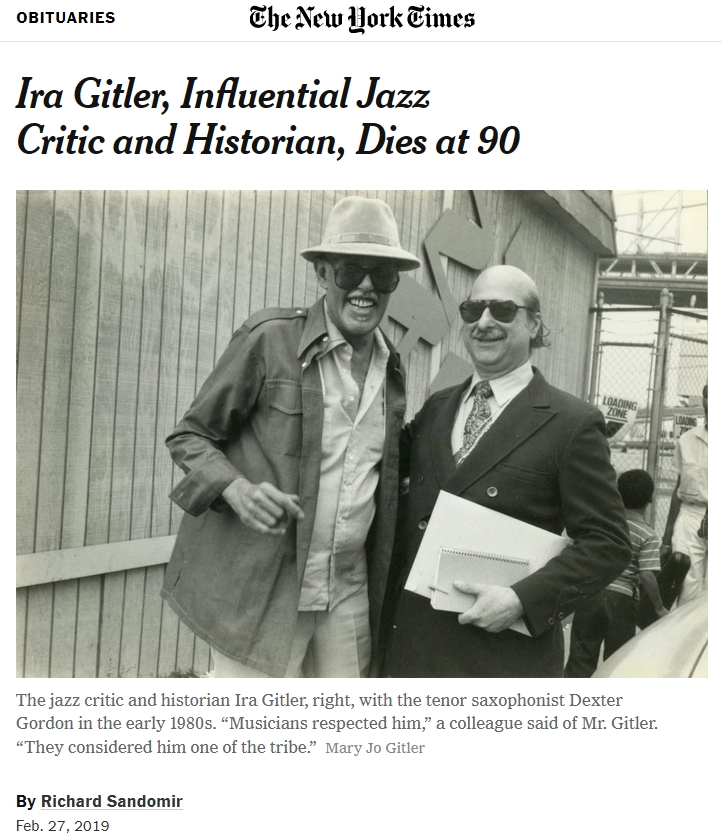Ira Gitler — R.I.P.
Posted: March 2nd, 2019, 3:17 pm

Ira Gitler, who was one of the most respected and prolific jazz writers of the postwar era and an early champion of bebop, died on Saturday in Manhattan. He was 90.
His son, Fitz, confirmed the death, at a nursing facility.
Mr. Gitler’s criticism appeared regularly in publications like DownBeat and JazzTimes. He wrote two books about bebop, the challenging form of modern jazz that emerged in the 1940s. And, along with Leonard Feather and Nat Hentoff, he was among the most prodigious writers of liner notes, annotating more than 700 albums.
In 2017 he was named a Jazz Master by the National Endowment for the Arts.
“He had a terrific ear, and could not be fooled by reputation, no matter how,” the jazz writer Gary Giddins said in an email. “Musicians respected him; they considered him one of the tribe. You can’t say that about a lot of critics.”
Mr. Gitler’s immersion in modern jazz led him to a job with the jazz label Prestige Records in 1950. He packed and unpacked 78s, did promotional work and swept the floors. More important, he wrote his first liner notes, in 1951, for “Swingin’ With Zoot Sims,” and later that year produced his first recording session, for the saxophonist Sonny Rollins.
In 1953, he produced a memorable session with Miles Davis on trumpet and Charlie Parker and Mr. Rollins on saxophones. It was, he recalled, a difficult afternoon: Davis was late and, while the group waited, Parker drank nearly a bottle of gin in two large gulps and dozed off. After Davis’s arrival, Mr. Gitler told him, in profane terms, that he was not playing well.
“Maybe he wanted to leave — I think he was bluffing — but he started packing up his horn,” Mr. Gitler said in a 2009 video interview with the filmmaker Bret Primack. “I said I didn’t mean anything, that I was trying to get him going.”
Davis stayed, and the session proceeded. They recorded three songs, finishing with the Thelonious Monk ballad “ ’Round Midnight,” which Mr. Gitler felt would be less taxing on Davis.
“It turned out to be kind of somber,” Mr. Gitler said. “It had the feeling of that day, and to me it was a masterpiece.” The tune became a staple of Davis’s repertoire.
Mr. Gitler, an amateur saxophonist, called Prestige his finishing school, and his experience there informed the rest of his career. His knowledge of jazz — acquired by going to nightclubs, attending recording sessions and hanging out with musicians — made him an erudite figure in the field. He was an early supporter of musicians like the tenor saxophonist Dexter Gordon, who spent many years in Europe and out of the American limelight before experiencing a career resurgence in the 1970s.
more